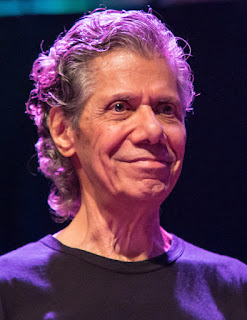Four pianists cap Jazz Kitchen's three-day tribute to the late Chick Corea
 |
| Chick Corea (1941-2021) |
In a recent online gathering of active jazz stars, Patrice Rushen identified Chick Corea's signal contribution to the music as a balance of precision and spontaneity.
Preston Williams welcomed Rushen and a range of other luminaries to "Jazz Talk" shortly after Corea's death in February. As Rushen indicated, the honoree's compositions have an open-ended feeling enfolded in well-focused structures.
It's true that the open-endedness sometimes took over, lending Corea's vast output an encyclopedic, come-one-come-all quality. But that was the result of his ceaseless curiosity and receptiveness, which drew from Williams' Zoom-assembled panel unanimous praise.
That means, I would guess, that there are very few Corea "completists" — fans who find everything he did to their taste. As the great New Yorker critic Whitney Balliett once noted in introducing his jaundiced view of a Corea set in a 1981 festival: "Chick Corea changes his musical address every year or so." Not every jazz fan can enable his/her musical GPS to make satisfying visits to all those places.
The way four pianists (with assisting bass and drums) handled this range at the Jazz Kitchen Sunday evening was to focus the set on unaccompanied solos from each man, fanning out into trio turns, plus quartets with acoustic and electric keyboards blending from two sides of the bandstand. Finally, there was a perhaps predictable but undeniably exciting finale, with everyone onstage for a romp through "Spain."
Precision and spontaneity thus had plenty of room to find the right balance, and the result was both steady and affectionate. Steve Allee presided, with assistance from Scott Routenberg, Steven Jones, and Shawn McGowan. Bassist Nick Tucker and drummer Cassius Goens anchored the ensemble throughout, sitting out the solo numbers.
McGowan's mini-set near the top of the show encapsulated the Corea spectrum: "You're Everything" from the early Return to Forever repertoire and "Bud Powell" from a generation later, a tune reaching back to honor one of Corea's keyboard heroes, the high priest of bebop piano. The latter performance showed McGowan to be as at home on the acoustic piano as he was in the chime-like gloss, shimmer, and ping of the electronic instrument.
Steven Jones displayed his unaccompanied chops in "Oblivion," a Powell composition admired by Corea. The assertive grand-piano style Jones applied to the piece was welcome and idiomatic in expressing the confidence Powell mustered in his best music, which always stood in poignant contrast to the disarray of his personal life.
A couple of Corea's catchiest melodies — "Armando's Rhumba" and "Windows" — received winning solo interpretations by Routenberg and Allee, respectively. The relative ceremoniousness of the early "Tones for Joan's Bones," with Allee in trio format displaying his attractively voiced feeling for harmony, heralded the evergreen "Spain," with Jones and McGowan wearing their electronic keyboards and Allee and Routenberg seated at their instruments.
Everyone soloed in between repetitions of the famous two-part theme, and Goens crowned his astute work throughout the set with forceful yet varied soloing before the final chorus. "Spain" set a seal upon the Jazz Kitchen's imaginative mini-festival celebration of a true jazz hero, who is now safely installed in the music's Valhalla.



This was more than a performance; it was a celebration of Corea’s legacy and the endless possibilities he opened up for jazz.
ReplyDeleteAntonio Ciacca is a very talented pianis and similar to the artist profile you spotlight on your blog.